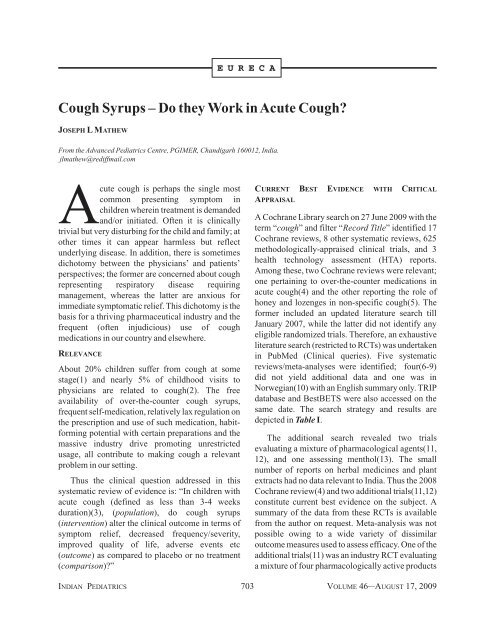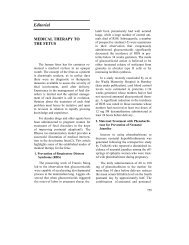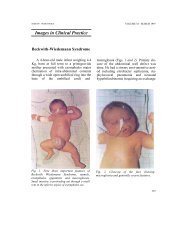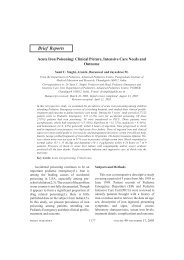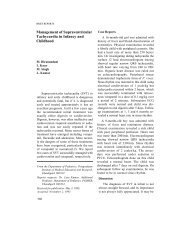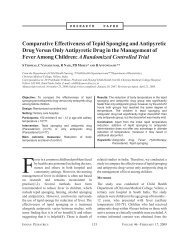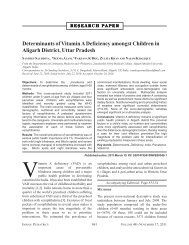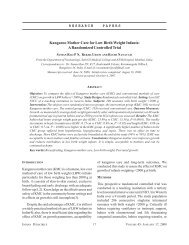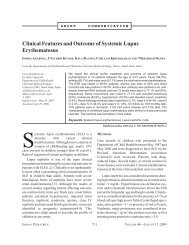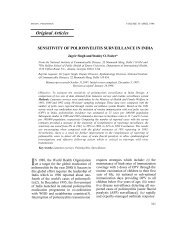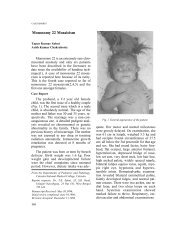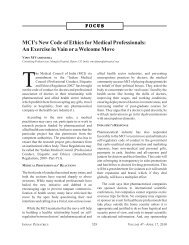Cough Syrups â Do they Work in Acute Cough? - medIND
Cough Syrups â Do they Work in Acute Cough? - medIND
Cough Syrups â Do they Work in Acute Cough? - medIND
Create successful ePaper yourself
Turn your PDF publications into a flip-book with our unique Google optimized e-Paper software.
E U R E C A<br />
<strong>Cough</strong> <strong>Syrups</strong> – <strong>Do</strong> <strong>they</strong> <strong>Work</strong> <strong>in</strong> <strong>Acute</strong> <strong>Cough</strong>?<br />
JOSEPH L MATHEW<br />
From the Advanced Pediatrics Centre, PGIMER, Chandigarh 160012, India.<br />
jlmathew@rediffmail.com<br />
<strong>Acute</strong> cough is perhaps the s<strong>in</strong>gle most<br />
common present<strong>in</strong>g symptom <strong>in</strong><br />
children where<strong>in</strong> treatment is demanded<br />
and/or <strong>in</strong>itiated. Often it is cl<strong>in</strong>ically<br />
trivial but very disturb<strong>in</strong>g for the child and family; at<br />
other times it can appear harmless but reflect<br />
underly<strong>in</strong>g disease. In addition, there is sometimes<br />
dichotomy between the physicians’ and patients’<br />
perspectives; the former are concerned about cough<br />
represent<strong>in</strong>g respiratory disease requir<strong>in</strong>g<br />
management, whereas the latter are anxious for<br />
immediate symptomatic relief. This dichotomy is the<br />
basis for a thriv<strong>in</strong>g pharmaceutical <strong>in</strong>dustry and the<br />
frequent (often <strong>in</strong>judicious) use of cough<br />
medications <strong>in</strong> our country and elsewhere.<br />
RELEVANCE<br />
About 20% children suffer from cough at some<br />
stage(1) and nearly 5% of childhood visits to<br />
physicians are related to cough(2). The free<br />
availability of over-the-counter cough syrups,<br />
frequent self-medication, relatively lax regulation on<br />
the prescription and use of such medication, habitform<strong>in</strong>g<br />
potential with certa<strong>in</strong> preparations and the<br />
massive <strong>in</strong>dustry drive promot<strong>in</strong>g unrestricted<br />
usage, all contribute to mak<strong>in</strong>g cough a relevant<br />
problem <strong>in</strong> our sett<strong>in</strong>g.<br />
Thus the cl<strong>in</strong>ical question addressed <strong>in</strong> this<br />
systematic review of evidence is: “In children with<br />
acute cough (def<strong>in</strong>ed as less than 3-4 weeks<br />
duration)(3), (population), do cough syrups<br />
(<strong>in</strong>tervention) alter the cl<strong>in</strong>ical outcome <strong>in</strong> terms of<br />
symptom relief, decreased frequency/severity,<br />
improved quality of life, adverse events etc<br />
(outcome) as compared to placebo or no treatment<br />
(comparison)?”<br />
CURRENT BEST EVIDENCE WITH CRITICAL<br />
APPRAISAL<br />
A Cochrane Library search on 27 June 2009 with the<br />
term “cough” and filter “Record Title” identified 17<br />
Cochrane reviews, 8 other systematic reviews, 625<br />
methodologically-appraised cl<strong>in</strong>ical trials, and 3<br />
health technology assessment (HTA) reports.<br />
Among these, two Cochrane reviews were relevant;<br />
one perta<strong>in</strong><strong>in</strong>g to over-the-counter medications <strong>in</strong><br />
acute cough(4) and the other report<strong>in</strong>g the role of<br />
honey and lozenges <strong>in</strong> non-specific cough(5). The<br />
former <strong>in</strong>cluded an updated literature search till<br />
January 2007, while the latter did not identify any<br />
eligible randomized trials. Therefore, an exhaustive<br />
literature search (restricted to RCTs) was undertaken<br />
<strong>in</strong> PubMed (Cl<strong>in</strong>ical queries). Five systematic<br />
reviews/meta-analyses were identified; four(6-9)<br />
did not yield additional data and one was <strong>in</strong><br />
Norwegian(10) with an English summary only. TRIP<br />
database and BestBETS were also accessed on the<br />
same date. The search strategy and results are<br />
depicted <strong>in</strong> Table I.<br />
The additional search revealed two trials<br />
evaluat<strong>in</strong>g a mixture of pharmacological agents(11,<br />
12), and one assess<strong>in</strong>g menthol(13). The small<br />
number of reports on herbal medic<strong>in</strong>es and plant<br />
extracts had no data relevant to India. Thus the 2008<br />
Cochrane review(4) and two additional trials(11,12)<br />
constitute current best evidence on the subject. A<br />
summary of the data from these RCTs is available<br />
from the author on request. Meta-analysis was not<br />
possible ow<strong>in</strong>g to a wide variety of dissimilar<br />
outcome measures used to assess efficacy. One of the<br />
additional trials(11) was an <strong>in</strong>dustry RCT evaluat<strong>in</strong>g<br />
a mixture of four pharmacologically active products<br />
INDIAN PEDIATRICS 703 VOLUME 46 __ AUGUST 17, 2009
EURECA<br />
ROLE OF COUGH SYRUPS<br />
TABLE 1 LITERATURE SEARCH STRATEGY FOR RANDOMIZED CONTROLLED TRIALS<br />
Search terms Filters Output Potentially relevant Additional data<br />
Central (2007-2009)<br />
<strong>Cough</strong> Record title 56 4 1<br />
Pubmed (Limits: All child, 01/01/2007 to 27/06/2009)<br />
cough Systematic reviews 34 5 0<br />
cougth antiussive AND 125 16 1<br />
cough antihistam<strong>in</strong>e cl<strong>in</strong>ical[Titlte/Abstract] 33 4 0<br />
cough decongestant AND 22 8 0<br />
cough expectorant trial[Title/Abstract]OR 43 13 0<br />
cough suppressant cl<strong>in</strong>ical trials [MeSH 1028 103 0<br />
cough mucolytic Terms] OR cl<strong>in</strong>ical 6 1 0<br />
cough syrup trial[Publication Type] 13 3 1<br />
cough over-the-counter OR 55 6 0<br />
cough dextromethorphan* random*[Title/Abstract] 28 4 0<br />
cough guaiphenes<strong>in</strong>/ OR random 7 2 0<br />
guaifenes<strong>in</strong><br />
allocation[MeSH Terms]<br />
cough bromhex<strong>in</strong>e OR therapeutic 5 2 0<br />
cough code<strong>in</strong>e use[MeSH Subhead<strong>in</strong>g]) 25 3 0<br />
TRIP database (www.tripdatabase.com)<br />
cough syrup None 62 2 0<br />
Best BETS (http://www.bestbets.org/database/browse-bets.php)<br />
cough None 5 1 0<br />
Date of updated search: 27 June 2009<br />
<strong>in</strong> children and assess<strong>in</strong>g a composite score of<br />
symptom relief of runny nose, congestion, pa<strong>in</strong> and<br />
cough. The mixture showed a significant benefit on<br />
the composite and <strong>in</strong>dividual symptom scores; this<br />
has been used by the authors to promote the<br />
comb<strong>in</strong>ation. The other RCT(12) showed that<br />
dextromethorphan was no better than placebo for the<br />
treatment of cough.<br />
The Cochrane review <strong>in</strong>cluded eight RCTs with<br />
616 participants hav<strong>in</strong>g cough associated with upper<br />
respiratory <strong>in</strong>fection (URI) and treated with various<br />
pharmacological agents s<strong>in</strong>gly or <strong>in</strong> comb<strong>in</strong>ation.<br />
There was no difference between various<br />
pharmacological agents compared to placebo/no<br />
treatment. The reviewers reported the usual str<strong>in</strong>gent<br />
methodological procedures that Cochrane Reviews<br />
are renowned for. They chose several relevant<br />
outcome measures that quantified improvement <strong>in</strong><br />
terms of change <strong>in</strong> severity or frequency of cough,<br />
comfort to the child <strong>in</strong> terms of impact on sleep, and<br />
parental assessment of improvement through scor<strong>in</strong>g<br />
systems. They also <strong>in</strong>troduced an additional<br />
ref<strong>in</strong>ement viz exclusion of parental or physician<br />
rat<strong>in</strong>g of ‘wellness’ that was not backed by objective<br />
measurements. This is methodologically appeal<strong>in</strong>g,<br />
but it could be argued that one of the roles of cough<br />
medication is to provide comfort to the patient and<br />
family, hence even subjective assessment of<br />
improvement may be a relevant outcome. In fact, this<br />
is a common argument used by many cl<strong>in</strong>icians to<br />
prescribe cough syrups on the grounds that parents<br />
deserve fulfilment of their demands. However, two<br />
f<strong>in</strong>d<strong>in</strong>gs of this systematic review conclusively<br />
dispel such views. First, the trials showed that relief<br />
with cough syrups was not only comparable to<br />
INDIAN PEDIATRICS 704 VOLUME 46 __ AUGUST 17, 2009
EURECA<br />
ROLE OF COUGH SYRUPS<br />
EURECA CONCLUSION IN THE INDIAN CONTEXT<br />
• <strong>Cough</strong> syrups are no better than placebo <strong>in</strong> children with acute cough, and have the risk of adverse effects.<br />
Therefore their use should be discouraged.<br />
placebo, but both were of a fairly high magnitude,<br />
suggest<strong>in</strong>g significant placebo effect. In other words,<br />
the symptomatic relief with cough syrups observed/<br />
reported <strong>in</strong> uncontrolled sett<strong>in</strong>gs (loosely referred to<br />
as personal experience by physicians) is likely to be<br />
noth<strong>in</strong>g more than placebo effect. In addition, sleep<br />
<strong>in</strong>duced by cough syrups may be mistakenly<br />
attributed as a therapeutic rather than side effect, <strong>in</strong><br />
some cases. The second observation that disallows<br />
exploit<strong>in</strong>g even the ‘placebo effect’ of cough<br />
medications is the frequency and severity of adverse<br />
events reported with most pharmacological<br />
preparations. These range from <strong>in</strong>significant and<br />
transient cl<strong>in</strong>ical events to serious adverse events<br />
and even death <strong>in</strong> rare <strong>in</strong>stances. These observations<br />
argue strongly aga<strong>in</strong>st us<strong>in</strong>g/prescrib<strong>in</strong>g/recommend<strong>in</strong>g<br />
cough syrups <strong>in</strong> children.<br />
What then can be done for children with cough?<br />
The Cochrane review did not evaluate nonpharmacological<br />
preparations such as honey, tulsi<br />
leaves, and other herbal preparations and their role<br />
(if any) is still open to question. Literature search<br />
showed scanty data either <strong>in</strong> support or aga<strong>in</strong>st such<br />
<strong>in</strong>terventions and this area needs further research,<br />
particularly <strong>in</strong> the Indian context. There is limited<br />
data emerg<strong>in</strong>g to suggest that honey may have a<br />
better anti-tussive effect than the placebo-equivalent<br />
efficacy of cough syrups. This could become an<br />
<strong>in</strong>terest<strong>in</strong>g area of research provided methodologically<br />
well designed trials us<strong>in</strong>g population and<br />
age appropriate objective scor<strong>in</strong>g systems are<br />
developed.<br />
EXTENDIBILITY<br />
None of the ten trials compris<strong>in</strong>g current best<br />
evidence was conducted <strong>in</strong> India; and only one was<br />
performed <strong>in</strong> a develop<strong>in</strong>g country sett<strong>in</strong>g(13).<br />
However as mentioned previously, the cl<strong>in</strong>ical<br />
condition (acute cough), population (otherwise well<br />
children), <strong>in</strong>tervention (nature and dosage of<br />
medication and metabolism thereof), and outcomes<br />
of <strong>in</strong>terest (cl<strong>in</strong>ical and social) are all extendible to<br />
our sett<strong>in</strong>g. Therefore the f<strong>in</strong>d<strong>in</strong>gs of this systematic<br />
review are applicable to our population.<br />
Conflict of <strong>in</strong>terest: None stated;<br />
Fund<strong>in</strong>g: None.<br />
REFERENCES<br />
1. Luyt DK, Burton PR, Simpson H. Epidemiological<br />
study of wheeze, doctor diagnosed asthma cough <strong>in</strong><br />
pre-school children <strong>in</strong> Leicestershire. BMJ 1993;<br />
306: 1386-1390.<br />
2. Yu TS, Wong TW, Wang XR, Songh H, Wong SL,<br />
Tang JL. Adverse effects of low-level air pollution<br />
on the respiratory health of school children <strong>in</strong> Hong<br />
Kong. J Occup Environ Med 2001; 43: 310-316.<br />
3. Chow PY, Ng DKK. Chronic cough <strong>in</strong> children.<br />
S<strong>in</strong>gapore Med J 2004; 45: 462-469.<br />
4. Smith SM, Schroeder K, Fahey T. Over-the-counter<br />
medications for acute cough <strong>in</strong> children and adults<br />
<strong>in</strong> ambulatory sett<strong>in</strong>gs. Cochrane Database Syst<br />
Rev 2008; 1: CD001831.<br />
5. Mulholland S, Chang AB. Honey and lozenges for<br />
children with non-specific cough. Cochrane<br />
Database Syst Rev 2009; 2: CD007523.<br />
6. Shields MD, Bush A, Everard ML, McKenzie<br />
S, Primhak R; British Thoracic Society <strong>Cough</strong><br />
Guidel<strong>in</strong>e Group. BTS guidel<strong>in</strong>es: Recommendations<br />
for the assessment and management of<br />
cough <strong>in</strong> children. Thorax 2008; 63 Suppl 3: iii1-<br />
iii15.<br />
7. Ryan T, Brewer M, Small L. Over-the-counter<br />
cough and cold medication use <strong>in</strong> young children.<br />
Pediatr Nurs 2008; 34: 174-180.<br />
8. Guirgius-Blake J. Over-the-counter medications<br />
for acute cough symptoms. Am Fam<br />
Physician 2008; 78: 52-53.<br />
9. Chang AB. <strong>Cough</strong>. Pediatr Cl<strong>in</strong> North Am 2009;<br />
56: 19-31.<br />
10. Småbrekke L, Melbye H. Medikamentell<br />
INDIAN PEDIATRICS 705 VOLUME 46 __ AUGUST 17, 2009
EURECA<br />
behandl<strong>in</strong>g av akutt hoste. Tidsskr Nor Legeforen<br />
2009; 129: 998-999.<br />
11. Mizoguchi H, Wilson A, Jerdack GR, Hull<br />
JD, Goodale M, Grender JM, et al. Efficacy of a<br />
s<strong>in</strong>gle even<strong>in</strong>g dose of syrup conta<strong>in</strong><strong>in</strong>g<br />
paracetamol, dextromethorphan hydrobromide,<br />
doxylam<strong>in</strong>e succ<strong>in</strong>ate and ephedr<strong>in</strong>e<br />
sulfate <strong>in</strong> subjects with multiple common cold<br />
symptoms. Int J Cl<strong>in</strong> Pharmacol Ther 2007; 45:<br />
230-236.<br />
ROLE OF COUGH SYRUPS<br />
12. Paul IM, Beiler J, McMonagle A, Shaffer<br />
ML, Duda L, Berl<strong>in</strong> CM Jr. Effect of honey,<br />
dextromethorphan, and no treatment on nocturnal<br />
cough and sleep quality for cough<strong>in</strong>g children and<br />
their parents. Arch Pediatr Adolesc Med 2007; 161:<br />
1140-1146.<br />
13. Sakcha<strong>in</strong>anont B, Ruangkanchanasetr S,<br />
Chantarojanasiri T, Tapasart C, Suwanjutha S.<br />
Effectiveness of antihistam<strong>in</strong>es <strong>in</strong> common cold. J<br />
Med Assoc Thai 1990; 73: 96-103.<br />
INDIAN PEDIATRICS 706 VOLUME 46 __ AUGUST 17, 2009


